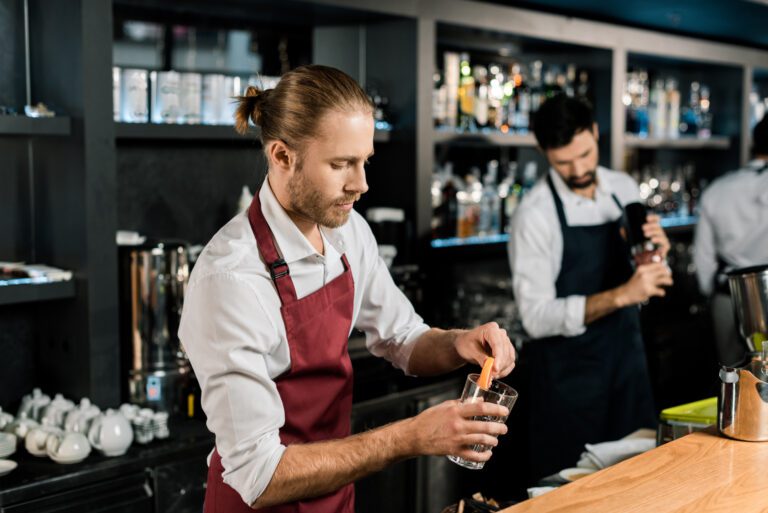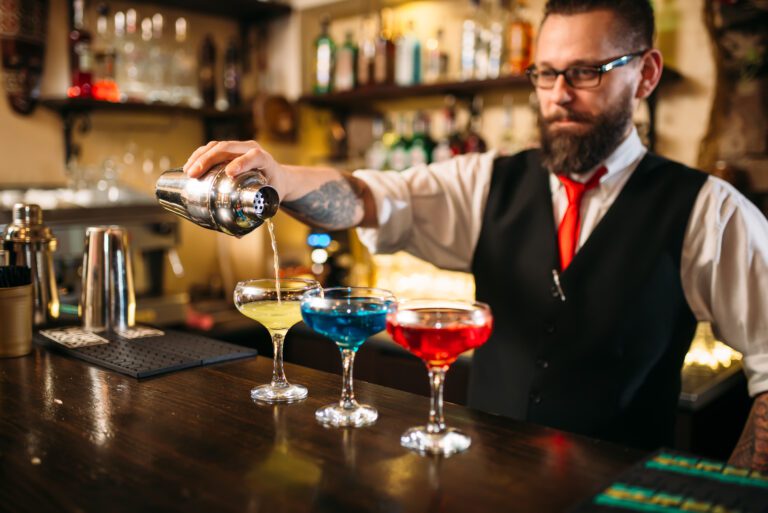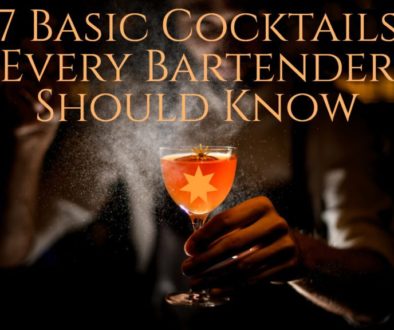Bartending, once viewed as a mindless second gig behind a counter, has shed its casual image and now stands tall as a revered and sought-after profession. Crafting mind-blowing cocktails, captivating patrons, and thriving in bustling social arenas has propelled bartending into the spotlight.
Mixology may be magic, but if you’ve been hiding under the staircase waiting for an owl to bring you an invitation to Bartending Hogwarts, we’re here to tell you it’s time to emerge. Bartending schools play a pivotal role in shaping the dreams of these aspiring bartenders, offering them a structured platform to acquire skills. The decision to enroll in one of these schools requires some serious contemplation, finding that magical balance between not breaking the bank and reaping those sweet, sweet rewards.

Contents
The Benefits of Bartending Schools
Bartending Skill Development
At the heart of bartending schools lies a commitment to skill development. These institutions offer a comprehensive curriculum that covers mixing techniques, drink recipes, and the art of presentation. From perfecting the shake to mastering the stir, students emerge with a repertoire of practical skills that set them apart in the competitive world of mixology.
Industry Insights
Beyond the bar counter, bartending schools delve into the intricacies of the bar industry. Students gain valuable insights into customer service dynamics, learning to navigate the delicate balance between hospitality and efficiency. Moreover, an understanding of alcohol regulations ensures that bartenders graduate with the knowledge necessary to responsibly serve and manage the legal aspects of their profession.
Networking Opportunities
One of the hidden gems of bartending schools is the networking opportunities they provide. Through collaborations with industry professionals, events, and internships, students can build a network that extends beyond the classroom. These connections often prove instrumental in securing job opportunities and advancing careers in the competitive hospitality industry.

Understanding the Costs
Tuition Fees
While the benefits are clear, the decision to enroll in a bartending school must be weighed against the associated costs. Tuition fees vary widely, influenced by factors such as the institution’s reputation, location, and the duration of the program. Prospective students should carefully examine these costs to ensure they align with their budget and expectations.
Additional Expenses
In addition to tuition fees, students must consider additional expenses that can impact their financial planning. These may include equipment costs, textbooks, and other materials essential for hands-on training. Understanding these extra costs ensures that students are not caught off guard during their educational journey.
Financial Aid Options
Acknowledging the financial burden that education can pose, many bartending schools offer various financial aid options. Scholarships, grants, and payment plans can provide relief to students facing budget constraints. Exploring these options and understanding the application processes can make bartending school more accessible to a broader range of aspiring mixologists.

How to Get Into Bartending School?
Before embarking on a journey through bartending school, prospective students must understand and fulfill common prerequisites for enrollment. These requirements often include a minimum age, legal eligibility to work with alcohol, and, in some cases, a high school diploma or equivalent. Ensure that you meet these prerequisites before proceeding with the application.
Common Prerequisites for Enrollment
Age Requirement
Most bartending schools have a minimum age requirement for enrollment. Commonly, students must be at least 18 years old to participate in bartending programs that involve serving alcohol.
Legal Eligibility
Prospective students need to meet legal eligibility criteria for working with alcohol. This may involve compliance with local and national laws regulating the service of alcoholic beverages and sometimes certification such as TX bartending certificate.
Educational Background
While not always mandatory, some bartending schools may require a minimum level of education, such as a high school diploma or its equivalent (GED). This ensures that students have a foundational level of academic knowledge.
Passion and Interest
An inherent interest in mixology and bartending is often considered a prerequisite. Schools may seek students who are genuinely passionate about the craft and eager to learn, as this enthusiasm contributes to a positive learning environment.
Communication Skills
Effective communication is a crucial aspect of bartending. While not explicitly listed as a prerequisite, schools may look for candidates with strong communication skills, as this is vital for interacting with customers and creating a positive atmosphere in the bar.
Commitment to Responsible Service
Given the nature of bartending, schools may seek candidates committed to responsible alcohol service. This involves understanding the legal and ethical aspects of serving alcohol and ensuring the well-being of patrons.
Clean Criminal Record
Some bartending programs may conduct background checks. A clean criminal record is often preferred to ensure the safety and trustworthiness of students in a bar environment.
Physical Requirements
Bartending can be physically demanding. While not a strict prerequisite, schools may consider a candidate’s physical ability to stand for extended periods, lift objects, and handle the rigors of a busy bar.
Language Proficiency
As communication is integral to bartending, schools may have language proficiency expectations. Students should have a sufficient command of the language in which the program is conducted to effectively interact with colleagues and customers.
Admission Test (if applicable)
Some schools may require candidates to take an admission test to assess their aptitude for bartending. This test may cover basic knowledge of mixology, customer service, and industry regulations.

Application Process
- Research Schools
Start by researching and identifying bartending schools that align with your goals. Consider factors such as location, reputation, and program offerings. - Prepare Necessary Documents
Gather the required documents, which commonly include identification, proof of eligibility to work with alcohol, and academic transcripts or equivalent. - Complete Application Form
Fill out the school’s application form accurately and completely. Ensure that you provide all requested information, including personal details and educational background. - Write a Personal Statement (if required)
Some schools may require a personal statement outlining your interest in bartending and career aspirations. Take the time to craft a thoughtful and genuine statement. - Submit Application Fee
Pay any required application fees. This is a standard part of the application process and ensures that your application is processed. - Attend an Interview (if required)
Some schools may conduct interviews as part of the selection process. Be prepared to discuss your motivation for entering the bartending profession and your commitment to the program. - Wait for Admission Decision
Once you have submitted your application, patiently await the admission decision. This may take some time, so be sure to check for any specified timelines. - Enroll and Plan Finances
Upon acceptance, follow the enrollment instructions provided by the school. Plan your finances, considering tuition fees and additional expenses. - Explore Financial Aid Options
If needed, explore financial aid options, such as scholarships or payment plans. Many schools offer assistance to make education more accessible.
By following these steps, aspiring bartenders can navigate the application process with confidence, ensuring they have a solid foundation for success in bartending school.

Frequently Asked Questions
What does bartending school cost?
The cost of bartending school varies significantly depending on factors such as the institution’s reputation, location, and program duration. Tuition fees, which cover the cost of education, alongside potential additional expenses for equipment, textbooks, and other materials, contribute to the overall expense. Prospective students should conduct a thorough exploration of these costs to make informed decisions based on their budget and expectations.
At LBS Bartending School, we believe in tailoring the price of our lessons to perfectly fit the unique needs of every student. Factors such as location, age, and instructor level are taken into consideration to create a truly customized experience.
Our online programs, starting at just $79, empower you to learn and grow from the comfort of your own space. For those seeking the camaraderie of a group setting, our group classes begin at $299, fostering a supportive and collaborative learning environment. And for those who crave the personal touch, our in-person lessons courses start at $399, providing a dedicated space for your growth and progress.
Remember, your journey towards greatness is worth every penny, and we are here to make it extraordinary.
Do you need a GED for bartending school?
While not universally required, some bartending schools may have educational prerequisites, such as a high school diploma or its equivalent, which includes a General Education Development (GED) certificate. Prospective students should carefully review the admission requirements of individual schools to ensure they meet the necessary educational criteria.
Does going to bartending school help?
Attending bartending school can provide valuable benefits, including skill development, industry insights, networking opportunities and job placement. However, it’s essential to weigh these advantages against potential disadvantages, such as the financial investment and the fact that practical experience in a real-world bar setting is equally crucial. Prospective students should carefully analyze their career goals and personal circumstances to determine if bartending school aligns with their aspirations.
How long is bartending school?
The duration of bartending school varies, with programs typically ranging from a few weeks to a couple of months. The length can be influenced by factors such as the intensity of the curriculum and whether the program offers additional training, such as mixology certifications. Prospective students should review the specific duration of the programs they are considering to find one that fits their schedule and preferences.

Conclusion
After thoroughly dissecting the wild and wacky world of bartending schools, one cannot deny the treasure trove of goodies they offer in terms of skill building, insider knowledge, and the chance to make some fabulous connections. But before you start waving your credit card around like a cocktail shaker, it’s important to take a good hard look at the price tag. Tuition fees, additional expenses, and the potential financial burden can definitely put a dent in your wallet.
So, future bartenders, think long and hard and consider your dreams and your wallet. By doing so, you’ll set sail on a journey that’ll not only sharpen your skills but also position you for success in the wild and wonderful world of bartending. Choose wisely, and perhaps your journey will polish your bartending chops but also set you up for success in the ever-evolving and gratifying realm of mixology. Cheers to that!





